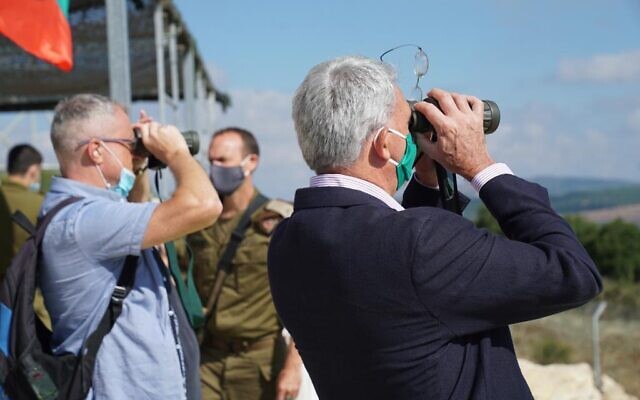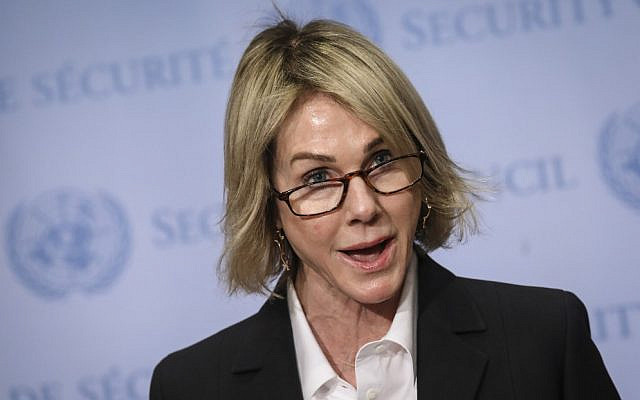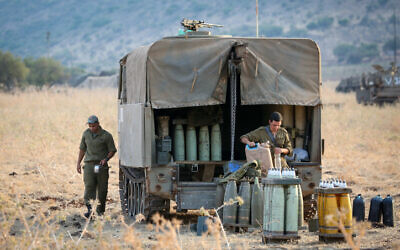
Backing Israeli demands, Washington said to push for reduction in troop numbers and other reforms, warning it could shut down force if rest of Security Council refuses.
The United States is warning it may veto a United Nations resolution extending the mandate of UN peacekeepers in southern Lebanon and dissolve the force, unless changes are made before an August 31 vote, according to a Wednesday report.
Israel has for years complained that the contingent of Blue Helmets deployed along the ceasefire line between Israel and Lebanon is ineffective at keeping the Hezbollah terror group from maintaining an armed presence on its doorstep, claims that Washington is now reportedly backing.
However, the rest of the Security Council seemingly backs a simple renewal of the existing mandate without changes, especially with Lebanon currently wracked by instability following the Beirut port explosion and the fall of its government.
Washington wants all restrictions on UNIFIL peacekeepers’ movements lifted, to better monitor the activities of Hezbollah, an Iran-backed Shiite terror group, according to the report in Axios, which cited US and Israeli officials.
The US is also demanding that the maximum number of UNIFIL troops be reduced from 15,000 to 11,000, with more of them moved to the border area where they can have the biggest impact.
Other demands include having the mandate be extended every six months, rather than a year, and for the force’s weapons and technology to be immediately upgraded, in accordance with recommendations by UN Secretary-General Antonio Guterres.
“Both us and the Americans stress that in the current reality Hezbollah is just too comfortable with UNIFIL, and this is unacceptable,” a senior Israeli official was quoted
as saying. The State Department told the outlet the US wants UNIFIL to “fully implement its mandate, consider and pursue revisions which reinforce success and recognize any shortcomings.”
“We are deeply concerned about Hezbollah’s challenges to UNIFIL’s freedom of movement and this is unacceptable,” a spokesperson said.
In New York, US representatives have held talks with China, France, Russia, the UK, the other permanent members of the UN Security Council, in the past few days to lay out its demands, the report said. American diplomats have reportedly told their French counterparts they will veto the resolution if UNIFIL’s mandate is not revised.
A veto would shut down the peacekeeping mission, 42 years after it was created to ostensibly bring peace to the restive border region.
Washington is ultimately seeking to make changes, and not fully disband the force, but sees the veto as its strongest bargaining chip, the report said.
On Wednesday, France circulated a draft resolution that diplomats said would extend the current UNIFIL mandate for a year. The diplomats, speaking on condition of anonymity because discussions have been private, predicted tough negotiations before the mandate expires on Aug. 31.
“Veto and then what? They will deploy 10,000 marines to replace UNIFIL?” a senior French diplomat was quoted saying by Axios. “I believe the mandate will be renewed before the end of the month without too much trouble,” the diplomat added.
UNIFIL was created to oversee the withdrawal of Israeli troops after a 1978 invasion. The mission was expanded after a 2006 war between Israel and Hezbollah fighters so that peacekeepers could deploy along the Lebanon-Israel border to help Lebanese troops extend their authority into their country’s south for the first time in decades.

At a closed council meeting Tuesday on the mission, US Ambassador Kelly Craft stressed the need for a new mandate.
“The US has long reiterated publicly and privately that the status quo in Lebanon is unacceptable,” Craft said in a statement to The Associated Press after the meeting.
“Now is the time to empower UNIFIL, end the long complacency, and enable the mission
to fully achieve what it was set out to accomplish.”
But Craft faces an uphill struggle because most of the council backs a continuation of the current UNIFIL mandate.
Germany’s deputy UN ambassador Günter Sautter told the council in remarks circulated by the country’s UN mission that “recent tensions and the danger of escalation only underline the importance of UNIFIL presence on the ground.” He said “the new political reality” since last week’s devastating explosion at Beirut’s port made it “more important than ever.”
“UNIFIL’s mandate continues to be of utmost importance,” Sautter said. “It is clear that UNIFIL will not be able to do more with less. We therefore fully support UNIFIL in its current mandate and strength, and we hope that the council will once more show unanimous support to this important mission.”

Guterres has written to the council calling for a 12-month renewal of UNIFIL’s mandate, stressing the importance of maintaining high troop strength.
Israel has repeatedly accused Hezbollah fighters of impeding the peacekeepers from carrying out their mandate.
Israel’s former ambassador Danny Danon said in May that Israel will insist that peacekeepers have access to all sites, that they have freedom of movement and that any time they are being blocked the UN Security Council must be immediately informed.
Craft said at that time that UNIFIL was being “prevented from fulfilling its mandate” and Hezbollah had “been able to arm itself and expand operations, putting the Lebanese people at risk.”
She said the Security Council “must either pursue serious change to empower UNIFIL or realign its staffing and resources with tasks it can actually accomplish.”
As of June 15, UNIFIL comprised 10,275 military personnel from 45 troop-contributing countries, 238 international civilian staff, and 580 national civilian staff.

Lebanon in the Golan Heights on July 27, 2020. (David Cohen/Flash90)
Its Maritime Task Force comprised six vessels, two helicopters and 864 of the force’s military personnel. However, one vessel was damaged in last week’s deadly explosion and over 20 naval personnel were injured, two critically.
Israel has pointed to the six underground passages built by Hezbollah and destroyed by Israel during a month-long operation in December 2018 as proof that UNIFIL does not have the tools to effectively maintain peace along the border. It has urged the Security Council to demand access to all sites and freedom of movement in Southern Lebanon to allow it to ensure that Resolution 1701 that ended the 2006 Second Lebanon War, and which calls for all armed groups outside the Lebanese military to be removed from southern Lebanon, is enforced.
(Times of Israel).